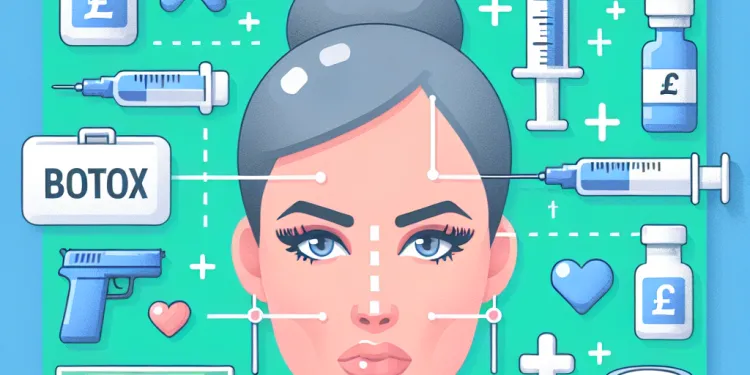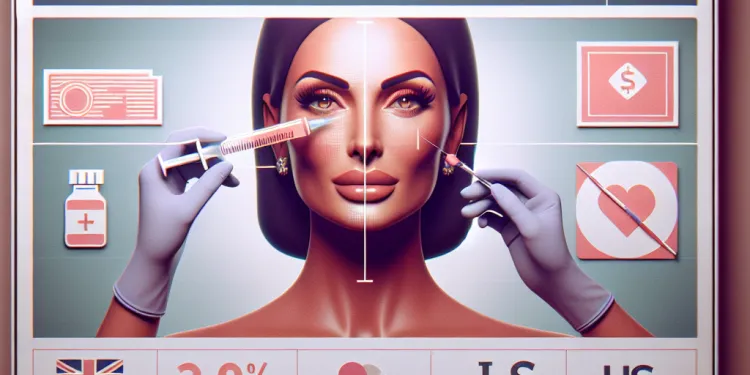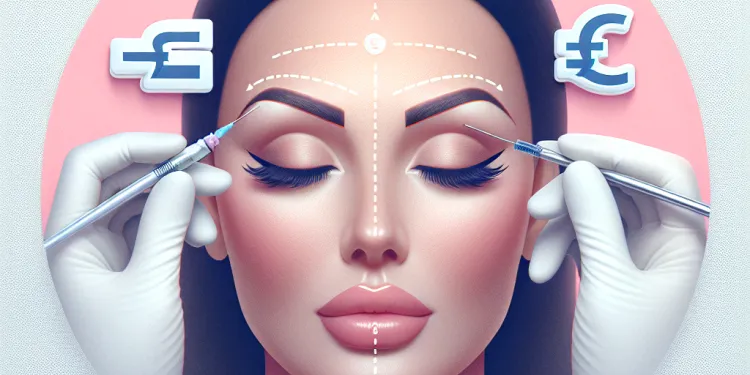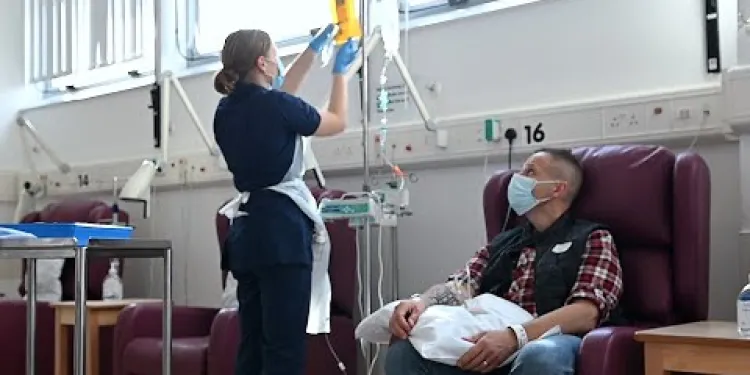
Find Help
More Items From Ergsy search
-

Is Botox treatment expensive?
Relevance: 100%
-

Can anyone get Botox treatments?
Relevance: 92%
-

How often should I get Botox treatments?
Relevance: 89%
-

Can I get Botulism from Botox Treatments?
Relevance: 89%
-

How should I choose a provider for Botox treatments?
Relevance: 86%
-

Is Botox safe?
Relevance: 81%
-

Is Botox safe?
Relevance: 79%
-

What is Botox?
Relevance: 79%
-

Is Botox vegan?
Relevance: 77%
-

What is Botox used for?
Relevance: 77%
-

Can Botox be used for migraines?
Relevance: 75%
-

Does Botox hurt?
Relevance: 74%
-

How does Botox work?
Relevance: 74%
-

Can Botox lift my eyebrows?
Relevance: 73%
-

What areas can be treated with Botox?
Relevance: 73%
-

Who can administer Botox?
Relevance: 73%
-

Can Botox help with excessive sweating?
Relevance: 73%
-

What are the side effects of Botox?
Relevance: 72%
-

How long do the effects of Botox last?
Relevance: 72%
-

What is Botox made from?
Relevance: 72%
-

How much does Botox cost?
Relevance: 72%
-

What are the common uses of Botox?
Relevance: 72%
-

How long does Botox last?
Relevance: 71%
-

Can I get Botox while pregnant?
Relevance: 71%
-

Are there any long-term effects of using Botox?
Relevance: 71%
-

What are the side effects of Botox?
Relevance: 70%
-

How soon will I see results from Botox?
Relevance: 70%
-

Does Botox injection hurt?
Relevance: 68%
-

How does Botox work if it's related to botulism toxin?
Relevance: 68%
-

How long has Botox been used in medicine?
Relevance: 68%
-

Is it safe to go abroad for medical treatments such as botox?
Relevance: 67%
-

How should I prepare for a Botox appointment?
Relevance: 67%
-

Can Botox be used for treating conditions other than wrinkles?
Relevance: 67%
-

Can Botox cause serious health issues?
Relevance: 67%
-

What precautions should I take before getting Botox?
Relevance: 66%
-

Can I get botulism from Botox treatments?
Relevance: 65%
-

What should I do if I experience side effects after a Botox injection?
Relevance: 63%
-

Can Botox spread to other parts of the body?
Relevance: 46%
-

Having chemotherapy and other treatments in the Day Treatment Unit
Relevance: 33%
-

Is there a treatment for measles?
Relevance: 32%
Introduction to Botox Treatments
Botox, a popular cosmetic procedure, involves injecting botulinum toxin type A to temporarily reduce the appearance of facial wrinkles and fine lines. In the UK, Botox has become increasingly accessible, with treatments available in many clinics across the country. However, not everyone may be suitable for these treatments. Understanding who can receive Botox is essential for ensuring both safety and effectiveness.
Who Can Get Botox?
In general, Botox is available for adults over the age of 18 who wish to address cosmetic concerns, such as frown lines, crow's feet, and forehead wrinkles. It may also be used for some medical conditions, such as chronic migraines and hyperhidrosis (excessive sweating). However, certain factors can influence eligibility for Botox treatments.
Medical Considerations
Before receiving Botox, it is crucial to consult with a qualified medical practitioner to assess suitability. Individuals with certain medical conditions, allergies to botulinum toxin, or infections at the injection site may be advised against the treatment. Pregnant or breastfeeding women are typically advised to avoid Botox due to the lack of research on its effects during these conditions.
Choosing a Qualified Practitioner
In the UK, Botox should only be administered by a licensed and experienced healthcare professional, such as a doctor, dentist, or nurse prescriber, who has received specific training in cosmetic injectables. It is important to ensure that the practitioner is registered with a relevant governing body, such as the General Medical Council (GMC) or the Nursing and Midwifery Council (NMC), and operates in a clinic that adheres to strict safety and hygiene standards.
Cosmetic vs. Medical Use
While many people seek Botox for cosmetic purposes, others may be eligible for treatment through the NHS for medically necessary conditions. For instance, Botox can be prescribed for medical issues such as cervical dystonia, bladder dysfunction, and specific types of muscular disorders. In such cases, a referral from a GP or specialist is typically required.
Costs and Considerations
The cost of Botox treatments in the UK can vary widely depending on the clinic, practitioner experience, and number of areas treated. It is important to avoid choosing practitioners solely based on cost, as low prices may indicate lower quality or lack of proper qualifications. Potential patients should ensure they feel comfortable with their practitioner and fully understand the procedure, risks, and expected outcomes.
Conclusion
Botox can be an effective solution for those looking to reduce facial wrinkles or address certain medical conditions. However, it is not suitable for everyone. Prior to receiving injections, individuals should thoroughly discuss their medical history and expectations with a qualified practitioner. Taking the time to choose a reputable provider ensures a safer and more satisfactory Botox experience.
Introduction to Botox Treatments
Botox is a treatment that makes wrinkles on your face look smoother. Doctors use a special medicine called botulinum toxin type A to do this. Many people in the UK go to clinics to get Botox. But not everyone can have it. You need to know who can and can't get Botox to stay safe and make sure it works.
Who Can Get Botox?
Adults over 18 who want to make their frown lines, crow's feet, or forehead wrinkles look better can get Botox. Sometimes, doctors use Botox for health problems too, like bad headaches or too much sweating. But some things can change if you can get Botox or not.
Medical Considerations
You need to talk to a doctor before getting Botox. This helps to see if it's safe for you. Some people can't have Botox because of certain health problems or allergies. If you are pregnant or breastfeeding, it is best not to get Botox.
Choosing a Qualified Practitioner
In the UK, only trained doctors, dentists, or nurses should give Botox. They must be trained in using Botox safely. Make sure they are listed with groups like the General Medical Council (GMC) or the Nursing and Midwifery Council (NMC). The clinic they work in should be clean and safe.
Cosmetic vs. Medical Use
People usually get Botox because they want to look better. But some need Botox for health reasons. For example, it can help with neck spasms or bladder problems. If you need Botox for health reasons, a doctor needs to say you can have it through the NHS.
Costs and Considerations
Botox prices in the UK can be different in each clinic. It depends on the doctor and how much work you need. Don't just pick the cheapest option. A low price might mean the doctor is not well-qualified. Make sure you trust the doctor and know what will happen before you go ahead.
Conclusion
Botox can help make wrinkles less noticeable or treat some health conditions. But it is not for everyone. Talk to a qualified doctor to make sure it is safe and right for you. Choosing a good doctor makes having Botox safer and gives better results.
Frequently Asked Questions
Who is eligible to receive Botox treatments?
Most adults over 18 in good health can receive Botox treatments, but a consultation with a healthcare provider is necessary to determine eligibility.
Can anyone get Botox for medical reasons?
Yes, Botox is approved for various medical conditions such as chronic migraines, excessive sweating, and certain muscle disorders. A doctor's prescription and consultation are required.
Are there any age restrictions for Botox treatments?
Botox is typically approved for adults aged 18 and over, but there may be exceptions for specific medical needs in younger individuals.
Can pregnant or breastfeeding women receive Botox?
Botox is not recommended for pregnant or breastfeeding women due to insufficient studies on its safety in these populations.
What health conditions might prevent someone from getting Botox?
Certain neurological disorders, skin infections at the injection site, or known allergies to Botox ingredients may prevent someone from getting treatments.
Is a consultation necessary before getting Botox?
Yes, a consultation with a qualified healthcare provider is necessary to assess suitability and discuss potential risks.
Can teenagers receive Botox treatments?
Botox is generally not recommended for cosmetic use in individuals under 18, though exceptions might be made for specific medical conditions.
Does insurance cover Botox treatments for medical reasons?
Insurance may cover Botox for FDA-approved medical conditions like chronic migraines, but typically not for cosmetic purposes.
Can people with allergies get Botox?
Individuals with allergies to Botox ingredients or severe allergies in general should discuss their options with a healthcare provider.
Are there any lifestyle factors that can affect eligibility for Botox?
Factors such as smoking, alcohol consumption, and overall skin care may affect candidacy and effectiveness of Botox treatments.
How can I find a qualified provider for Botox treatments?
Look for licensed healthcare professionals with experience in administering Botox, such as dermatologists or plastic surgeons.
Can I undergo Botox treatment if I have a planned surgery soon?
It's important to discuss upcoming surgeries with your provider, as timing and other factors may impact your ability to get Botox.
Are there any side effects from Botox that would impact eligibility for repeated treatments?
Common side effects may include bruising or swelling, but severe side effects or allergic reactions may influence future treatments.
Is Botox suitable for sensitive skin?
Individuals with sensitive skin can typically receive Botox, but should inform their provider about skin sensitivity during the consultation.
Do certain medications affect eligibility for Botox?
Certain medications, particularly blood thinners or those affecting muscle relaxants, may impact eligibility. Always disclose current medications to your provider.
Can individuals with autoimmune diseases receive Botox?
Patients with autoimmune conditions should consult with their healthcare provider to weigh the benefits and risks of Botox treatment.
How often can someone safely have Botox treatments?
Botox effects typically last 3-6 months, and most people can safely have repeat treatments within these intervals, based on professional guidance.
Are Botox treatments painful?
Most people experience minimal discomfort, often described as a pinching sensation. Providers can offer numbing solutions if necessary.
Can you receive Botox if you have a skin condition like eczema or psoriasis?
Conditions like eczema or psoriasis must be evaluated by a healthcare provider to ensure safe Botox administration, but they don't automatically disqualify treatment.
What precautions should be taken before receiving Botox?
Avoiding blood-thinning medications, alcohol, and communicating any health changes or concerns with your provider before treatment is important.
Who can get Botox?
People who are over 18 and feel healthy can usually get Botox. But first, they should talk to a doctor to make sure it's okay for them.
Can anyone use Botox to help with medical problems?
Yes, doctors use Botox to help with different medical problems. It can help if you have bad headaches that won't go away, sweat too much, or have certain muscle problems. You need to see a doctor and have a prescription to get it.
Can kids or teens get Botox?
Botox is for adults. Doctors usually don't give it to kids or teens.
If you're not sure, talk to your doctor. They can help you understand what's best.
Most people can get Botox if they are 18 or older. But sometimes, doctors might let younger people have Botox if they really need it for a medical reason.
Is it OK for pregnant or breastfeeding women to have Botox?
If you are pregnant or breastfeeding, it is best to talk to your doctor before having Botox. They can give you good advice.
Here are some tips to help you understand:
- Write down any questions you have and ask your doctor.
- Use pictures or videos to learn more about Botox.
- Ask a friend or family member to help you understand the doctor’s advice.
Botox is not safe for women who are pregnant or breastfeeding. There have not been enough studies to know if it is safe for them.
What health problems mean you can't get Botox?
Some health problems can stop you from getting Botox. Here are a few:
- Weak muscles in your face
- Trouble swallowing
- Nerve diseases
Before you get Botox, talk to your doctor. They can help you. You can also use pictures or videos to learn more about Botox. These help make it easier to understand.
Some people should not get Botox. This includes people with certain brain problems, skin infections where the needle goes, or if they are allergic to what is in Botox.
Do I need to talk to a doctor before having Botox?
Yes, you should talk to a doctor or nurse to see if it is safe for you and to learn about any risks.
Can teenagers get Botox?
Botox is a medicine that helps stop wrinkles.
Doctors usually give Botox to adults.
Sometimes, teenagers might want Botox for health reasons.
If a teenager wants Botox, they should talk to a doctor.
It is important for a doctor to decide if Botox is safe for them.
Here are some things that can help:
- Ask questions if you don't understand.
- Bring a friend or family member to the doctor with you.
- Use pictures to explain what you want to know.
Doctors usually do not use Botox to make young people under 18 look different. But sometimes, they might use it if someone has a specific health problem.
Will my insurance pay for Botox if I need it for health reasons?
If you need Botox to help with a health problem, ask your doctor if your insurance will pay for it. Your doctor can help you find out if your insurance will help pay. You can call your insurance company to check too. If you need help understanding, ask someone you trust to help explain.
Sometimes, insurance pays for Botox if a doctor says you need it for health reasons, like really bad headaches. But insurance usually doesn’t pay for Botox if you want it to look different.
Can people with allergies use Botox?
If you have allergies, you might wonder if you can use Botox. Botox is a special medicine that some people use to make wrinkles go away.
It is important to talk to a doctor if you have allergies and want to use Botox. The doctor can tell you if it is safe for you.
Here are some tips to help you understand better:
- Bring a list of your allergies when you talk to your doctor.
- Ask questions about how Botox is given and what happens after.
- Use pictures or videos to help understand how Botox works.
If you are allergic to Botox or have bad allergies, talk to your doctor. They can help you decide what to do.
Can the way you live affect if you can get Botox?
Things like smoking, drinking alcohol, and how you take care of your skin can change if Botox works well for you.
How can I find a good doctor for Botox?
Find a doctor or nurse who knows how to use Botox. They should be trained and have experience. A skin doctor (dermatologist) or a doctor who helps make people look different (plastic surgeon) can help you.
Can I get Botox if I will have surgery soon?
If you are going to have surgery soon, talk to your doctor before getting Botox. Your doctor will tell you if it is safe.
Here are some tips to help you:
- Ask your doctor lots of questions.
- Talk with someone you trust about what the doctor says.
- Write down important things to remember.
Talk to your doctor if you have a surgery soon. The timing of your surgery and other things might affect when you can get Botox.
Can Botox cause problems that make it hard to have it again?
You might get a bruise or some swelling. If you have a bad reaction, it can change your future treatments.
Can I use Botox if I have sensitive skin?
If your skin is sensitive, you can still have Botox. Just make sure to tell the doctor or nurse about it before you start.
Can I get Botox if I am taking other medicines?
Some medicines can affect if you can get a treatment. This is especially true for blood thinners and medicines that help relax muscles. It is very important to tell your doctor about all the medicines you are taking.
Can people with autoimmune diseases get Botox?
People with autoimmune diseases should talk to their doctor before getting Botox. The doctor can say if it is safe or not.
If it's hard to understand, ask someone you trust to help explain. You can also use pictures or videos about Botox to learn more.
If you have an illness where your body attacks itself, talk to your doctor before using Botox. Your doctor can help you decide if it is a good idea for you.
How often can you safely get Botox?
You can have Botox every 3 to 4 months. Always talk to your doctor.
Helpful tip: Use pictures or videos to help understand how Botox works.
Remember, ask an adult if you have questions.
Botox effects usually last 3 to 6 months. Most people can have more treatments every 3 to 6 months, if their doctor says it is okay.
Does Botox hurt?
Botox is a treatment some people use to reduce wrinkles. They use a needle to put Botox into your skin.
Some people say it feels like a little pinch. Others say it does not hurt much at all.
Before the treatment, you can use ice or numbing cream to help with the pain.
If you are worried, you can talk to your doctor or a nurse. They will explain everything and help you feel better.
Most people feel little pain. It may feel like a small pinch. Doctors can give you something to numb the area if needed.
Can you get Botox if you have skin problems like eczema or psoriasis?
Botox is a treatment. Some people use it for wrinkles. If you have skin problems, like eczema or psoriasis, talk to a doctor first. It is important to check if Botox is safe for you.
You can also use tools like picture cards or apps to help you understand. A friend or family member can also help explain.
If you have skin problems like eczema or psoriasis, a doctor needs to check them before you can get Botox. But having these skin problems doesn't mean you can't have Botox.
What should you do before getting Botox?
Here are things to do:
- Talk to your doctor. Tell them about any health problems.
- Make sure you are not allergic to Botox.
- Avoid taking blood-thinning medicines, like aspirin, for a few days before.
- Tell your doctor if you are pregnant or breastfeeding.
- If you have any questions, ask your doctor.
Using tools like pictures or videos can help understand better. A friend or family member can also support you during your visit to the doctor.
Before you have treatment, you should:
- Stay away from medicines that make your blood thin.
- Do not drink alcohol.
- Tell your doctor if you feel unwell or have any worries.
These tips can help you stay safe and healthy.
Useful Links
Have you found an error, or do you have a link or some information you would like to share? Please let us know using the form below.
-->
This website offers general information and is not a substitute for professional advice.
Always seek guidance from qualified professionals.
If you have any medical concerns or need urgent help, contact a healthcare professional or emergency services immediately.
Some of this content was generated with AI assistance. We’ve done our best to keep it accurate, helpful, and human-friendly.
- Ergsy carfully checks the information in the videos we provide here.
- Videos shown by Youtube after a video has completed, have NOT been reviewed by ERGSY.
- To view, click the arrow in centre of video.
- Most of the videos you find here will have subtitles and/or closed captions available.
- You may need to turn these on, and choose your preferred language.
- Go to the video you'd like to watch.
- If closed captions (CC) are available, settings will be visible on the bottom right of the video player.
- To turn on Captions, click settings .
- To turn off Captions, click settings again.
More Items From Ergsy search
-

Is Botox treatment expensive?
Relevance: 100%
-

Can anyone get Botox treatments?
Relevance: 92%
-

How often should I get Botox treatments?
Relevance: 89%
-

Can I get Botulism from Botox Treatments?
Relevance: 89%
-

How should I choose a provider for Botox treatments?
Relevance: 86%
-

Is Botox safe?
Relevance: 81%
-

Is Botox safe?
Relevance: 79%
-

What is Botox?
Relevance: 79%
-

Is Botox vegan?
Relevance: 77%
-

What is Botox used for?
Relevance: 77%
-

Can Botox be used for migraines?
Relevance: 75%
-

Does Botox hurt?
Relevance: 74%
-

How does Botox work?
Relevance: 74%
-

Can Botox lift my eyebrows?
Relevance: 73%
-

What areas can be treated with Botox?
Relevance: 73%
-

Who can administer Botox?
Relevance: 73%
-

Can Botox help with excessive sweating?
Relevance: 73%
-

What are the side effects of Botox?
Relevance: 72%
-

How long do the effects of Botox last?
Relevance: 72%
-

What is Botox made from?
Relevance: 72%
-

How much does Botox cost?
Relevance: 72%
-

What are the common uses of Botox?
Relevance: 72%
-

How long does Botox last?
Relevance: 71%
-

Can I get Botox while pregnant?
Relevance: 71%
-

Are there any long-term effects of using Botox?
Relevance: 71%
-

What are the side effects of Botox?
Relevance: 70%
-

How soon will I see results from Botox?
Relevance: 70%
-

Does Botox injection hurt?
Relevance: 68%
-

How does Botox work if it's related to botulism toxin?
Relevance: 68%
-

How long has Botox been used in medicine?
Relevance: 68%
-

Is it safe to go abroad for medical treatments such as botox?
Relevance: 67%
-

How should I prepare for a Botox appointment?
Relevance: 67%
-

Can Botox be used for treating conditions other than wrinkles?
Relevance: 67%
-

Can Botox cause serious health issues?
Relevance: 67%
-

What precautions should I take before getting Botox?
Relevance: 66%
-

Can I get botulism from Botox treatments?
Relevance: 65%
-

What should I do if I experience side effects after a Botox injection?
Relevance: 63%
-

Can Botox spread to other parts of the body?
Relevance: 46%
-

Having chemotherapy and other treatments in the Day Treatment Unit
Relevance: 33%
-

Is there a treatment for measles?
Relevance: 32%


